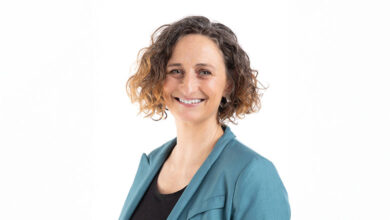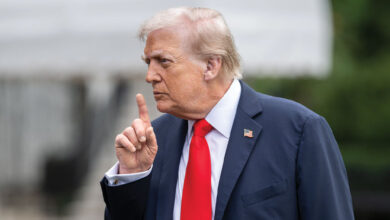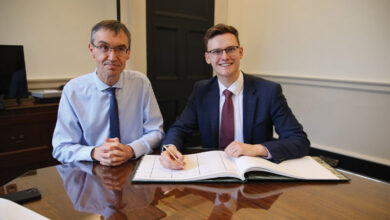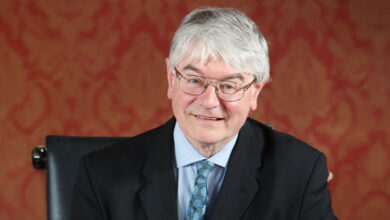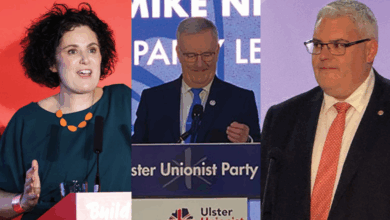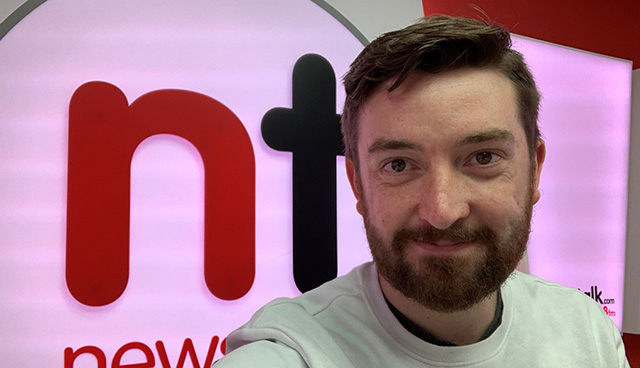
A graduate of DCU, Seán Defoe is Group Political Correspondent for Communicorp stations Newstalk, Today FM, 98FM, Spin 1038 and Spin South-West.
How did you get into journalism?
Completely by accident! I had fully intended to be an architect or an engineer right up until a week or two before the CAO deadline in sixth year. Then Tommie Gorman from RTÉ happened to visit my school for a show he was filming, and they asked me to show him around. He brought such energy and enthusiasm to what he was doing which set off in my head that you can actually get paid to do something you love! When I combined that with my natural love of talking and being a little nosy (as well as the bottom falling out of the construction industry at that time) it made sense that a career in radio could be on the cards. On his way out the door, I asked Tommie how to become a journalist and to be fair to him he gave me some sage advice. I changed my CAO to journalism in DCU the next day.
How do you think the profession is evolving?
It is already very different from when I started working professionally eight years ago. For one the industry is contracting and there are fewer jobs. When I started there was every chance that at an event you would have journalists from Newstalk, Today FM, 98FM, FM104, RTÉ and TV3 (as it was then). Whereas now there is usually only one radio reporter there representing and filing to the entire independent broadcast market.
You’re also nothing without content online and on social media. I don’t think we’ve quite reached the tipping point where more people are getting their news from social media than are getting it on the radio, especially with the resurgence it’s had during Covid, but things are definitely trending towards online. Which also means you need to be able to tailor your content for other platforms. How I present something in a 5-minute radio interview naturally has to be different to how I tell the same story in a 280-character tweet.
There is more of a responsibility now to get things right in this generation of fake news. Spin, propaganda and lies have always been there but with everyone carrying a mini-supercomputer in their pocket now it’s never been easier to spread. The longevity test for journalists and media outlets will be won on trust in good, fair and accurate reporting.
What are the challenges of working in broadcast media?
The immediacy of radio has probably helped journalists who work in it to adapt more quickly to online journalism. One of the difficulties is turning around content for many more platforms than before. So, if there is a government announcement at quarter to the hour it needs to be in the bulletin at the top of that hour, preferably with audio. That means you’re trying to take in the announcement, write it up, cut the audio clip and usually to live tweet the highlights as well. All while trying to think of what question you should ask when the speeches stop! So it’s very fast paced.
On a broader note broadcasters are obviously facing all sorts of revenue difficulties and though Communicorp and Virgin Media are pumping out high-quality public service broadcasting we get no slice of the TV licence fee to support that and reform seems to be happening at a glacial pace.
“The immediacy of radio has probably helped journalists who work in it to adapt more quickly to online journalism.”
Who do you admire most within the industry and why?
What many people might not realise is a very large portion of the political journalists putting out the best stuff at the moment are very young and are only in their late 20s or early 30s. The whole team at the Irish Examiner, Jennifer Bray with the Irish Times, Ciara Phelan at the Mirror and Christina Finn with TheJournal in particular are very sharp and tell the news in a way that’s really accessible for real people with very little government nonsense or jargon. Though I’d have to say it’s the former holder of my job Gavan Reilly from Virgin Media who I admire most. I’m lucky enough to share an office with him, which is like sitting next to a supercomputer with a sense of humour. He’s really leading the way when it comes to this new age of social media journalism.
On the broadcasting front, someone I hugely admire is Joe Molloy from Off The Ball. The way he puts guests at total ease even with difficult subjects means he draws much more from an interview than most people. Will O’Callaghan also of OTB should get a mention too. I don’t know anyone else who could transition from pure sports broadcasting to guest hosting The Last Word with as much ease and skill.
What has been your most significant story or project to date?
It’s hard to look past Covid-19 as the most significant, all-consuming story I’ve ever covered and possibly that I will ever cover. I’ll never forget being on the steps of Blair House, across from the White House, that morning in March 2020 when then Taoiseach Leo Varadkar announced the schools were to shut and life was turned upside-down for all of us. It’s strange to think that at 27 years old I might never cover a story as big as this again.
As for the story that probably will stay with me the longest, it would have to be the inquest into the Buncrana pier tragedy in 2017. It was incredibly harrowing to hear the details of the deaths of the five members of one family, including three children. You learn to contain your emotions in journalism and report impartially but when the microphone goes off stories like that stay with you.
How do you spend your time outside of work?
Well at the moment the same way as everyone else; not doing a whole lot! I genuinely loved going for long walks before Covid but now they’re getting a bit tiresome. I love going to concerts and festivals and the day I can see Luke O’Neill on stage with his band instead of on TV talking about the virus will be a good one. I’m a bit of a bookworm which has been a great help over the last year. At the start of lockdown I bought a PlayStation and some weights; one of those has gotten a lot of use!

